A real estate executive from New York, Kevin Feng Gao, has been arrested and charged with a serious crime: bank fraud. This charge comes after it was discovered that Gao used a dishonest scheme to steal $30 million, which was intended as an investment in a Manhattan real estate project. Gao is accused of tricking a bank into opening a fake account, which he then used to divert the money. This crime highlights the dangers of fraudulent activity in the business world, especially when large sums of money are involved.
How Kevin Gao Orchestrated the Scheme
Kevin Gao, 37, who lives in Queens, New York, worked as an executive at a company that was involved in a joint venture for a real estate development project in Manhattan. However, he had no permission to open any bank accounts in the name of the company managing the project. Despite this, he managed to trick a bank into opening an unauthorized corporate account, which he then used to carry out his plan.
To get the account opened, Gao lied to bank employees. He claimed that he had the approval of the company managing the real estate project. When the bank asked for the company’s official operating agreement, Gao didn’t provide the real one. Instead, he gave the bank a fake document. With these false representations, Gao successfully opened a fraudulent bank account that was not controlled by the real estate company, but rather by him.
Maximus Settles Fraud Allegations for $8 Million After Misleading Census Bureau
The Stolen Investment Money
The next part of the scheme involved a significant financial transaction. An investment company had agreed to invest $30 million into the real estate project in Manhattan. However, instead of sending the money to the legitimate account held by the company managing the project, the investment company transferred the funds into the fake account that Gao had opened.
Once the $30 million landed in the fraudulent account, Gao didn’t hesitate. He quickly moved the money to various accounts that were under his control and the control of his associates. This money, which was meant to support the real estate project, was instead stolen by Gao and his co-conspirators.
The Legal Consequences and Arrest
Gao was arrested and charged with one count of bank fraud. If convicted, he faces up to 30 years in prison. The charge of bank fraud is a serious one, as it involves deceiving a financial institution to steal money, which can harm not only the bank but also other individuals and businesses that rely on the integrity of the banking system.
Elie Schwartz Admits to $62.8M Fraud Scheme Targeting Investors
The investigation into Gao’s actions was carried out by the FBI, with the support of the U.S. Attorney’s Office for the Southern District of New York. FBI Assistant Director in Charge James E. Dennehy emphasized the importance of stopping fraud and deceitful acts, especially those that involve large sums of money. The authorities are committed to tracking down individuals who use dishonest methods to steal from others.
Gao’s case is being handled by the Illicit Finance and Money Laundering Unit of the U.S. Attorney’s Office, and prosecutors Christopher Brumwell and Maggie Lynaugh are leading the effort to bring him to justice. While he is presumed innocent until proven guilty, his actions have already caused significant damage, and the authorities are working hard to ensure that he is held accountable for his crime.
This case serves as a reminder of how important it is to protect the financial system and ensure that people involved in handling large amounts of money are honest and trustworthy. Fraudulent actions like those allegedly committed by Gao can have far-reaching consequences, not just for the businesses involved, but also for the public trust in the financial system.


